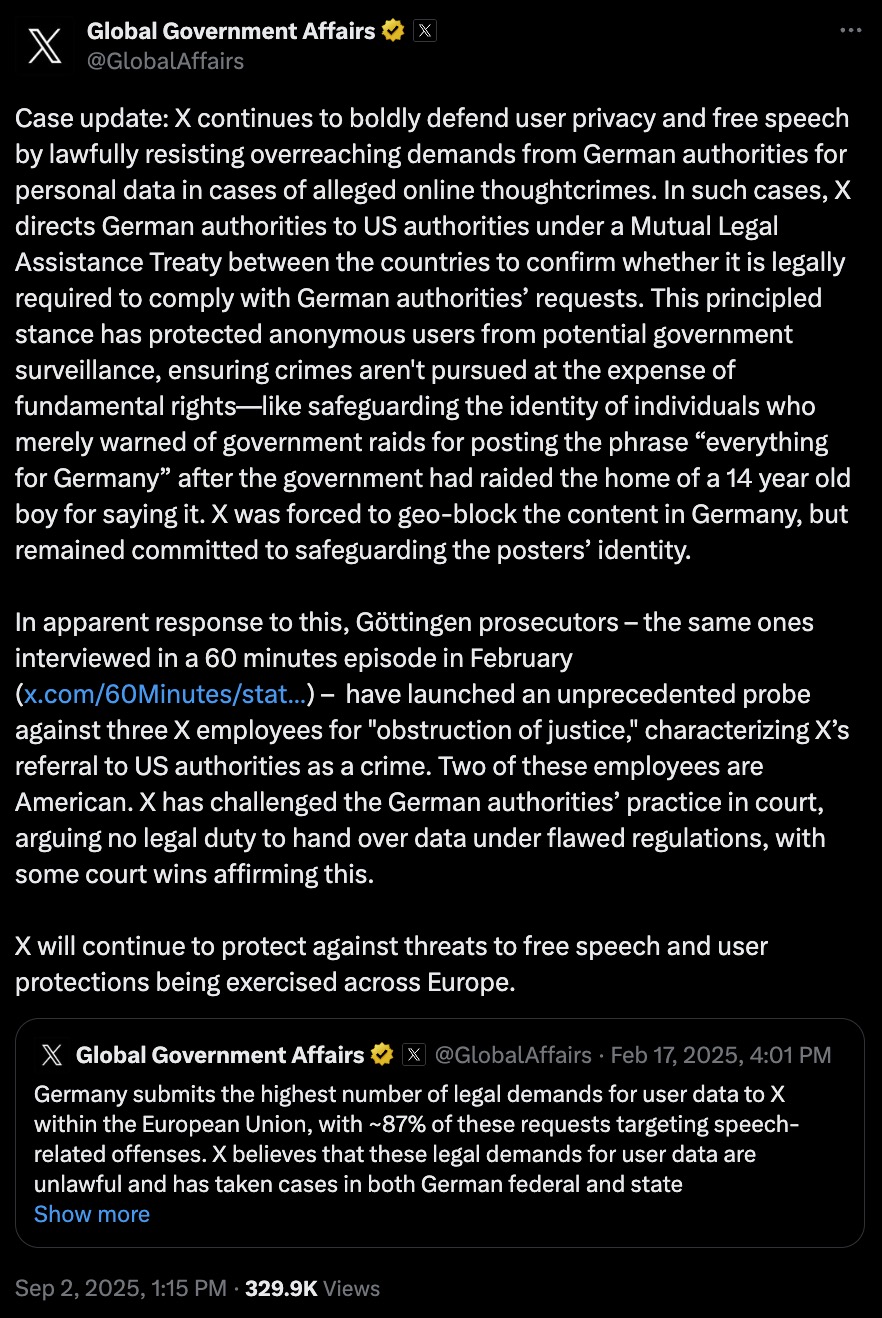German authorities have opened a criminal investigation targeting three managers at X, accusing them of “obstruction of justice” for refusing to directly provide user data in online speech-related cases.
Two of the employees are American, and one of them is reportedly Diego de Lima Gualda, the former head of X’s operations in Brazil, who previously faced off against legal demands in his home country before resigning in April 2024.
The alleged problem for Germany is X’s policy of forwarding German requests for user data to US authorities, following procedures established under a bilateral Mutual Legal Assistance Treaty (MLAT).
That treaty lays out the legal framework for cross-border data sharing, requiring requests from German prosecutors to be reviewed and processed through US legal channels before X is compelled to hand over user information.
Despite this legally grounded process, prosecutors in Göttingen have decided to treat the policy as criminal interference, marking what appears to be the first time in German legal history that social media executives are being investigated for how they respond to international legal requests.
German prosecutors have reportedly been frustrated by X’s unwillingness to grant them direct access to account data, particularly in cases involving posts that include banned symbols like swastikas or comments that authorities allege may amount to defamation.
The inability to obtain data has resulted in stalled investigations and dropped cases, including one where a post containing a swastika could not be traced to its author.
Although X restricted that post within Germany, the company declined to release identifying information.

X’s resistance has prompted anger from members of Germany’s pro-censorship political class.
Green Party MP Anna Lührmann labeled the standoff a “scandal” and demanded that government institutions leave the platform entirely. “This goes against fair competition and puts our democracy at risk,” she claimed, accusing Musk of algorithmically shaping discourse and undermining political fairness.
She also urged Chancellor Friedrich Merz to shut down his official presence on X and move to alternatives like Mastodon or Bluesky.
The Göttingen prosecutor’s office, which handles digital “hate speech” enforcement for Lower Saxony, was recently profiled in a 60 Minutes segment aired in the US back in February.
The episode followed German authorities as they conducted armed raids on citizens for online posts and stirred backlash in the United States, where such criminalization of speech is often seen as incompatible with basic civil liberties.
US Vice President JD Vance was among those who condemned the German approach, calling it a threat to transatlantic values and freedom of expression.
Meanwhile, X is fighting back in German courts. According to reporting from t-online, the company has retained the international law firm White & Case to challenge the legal demands from multiple German prosecutors. In case after case, X has argued that Germany’s demands for user data cannot override international treaties or US privacy protections.
In some German district courts, these challenges have been rejected.
Judges have ruled that Germany’s Telecommunications Digital Services Data Protection Act (TDDDG) grants prosecutors the authority to demand data and that social networks must comply even if they consider the law invalid or unlawful.
Senior public prosecutor Benjamin Krause confirmed that X had filed numerous motions to block requests, all of which leaned on contested interpretations of procedural law.
X’s legal strategy also includes a broader constitutional challenge. In February 2024, the company filed suit in the administrative court in Wiesbaden, asking the court to examine whether Section 22 of the TDDDG complies with both German constitutional protections and European Union law.
A ruling in that case could eventually be referred to either Germany’s Federal Constitutional Court or the European Court of Justice.
The German government is moving to criminally punish platform employees for not helping the state identify anonymous users who post controversial or politically sensitive content. This, of course, is a dangerous step with global implications.










